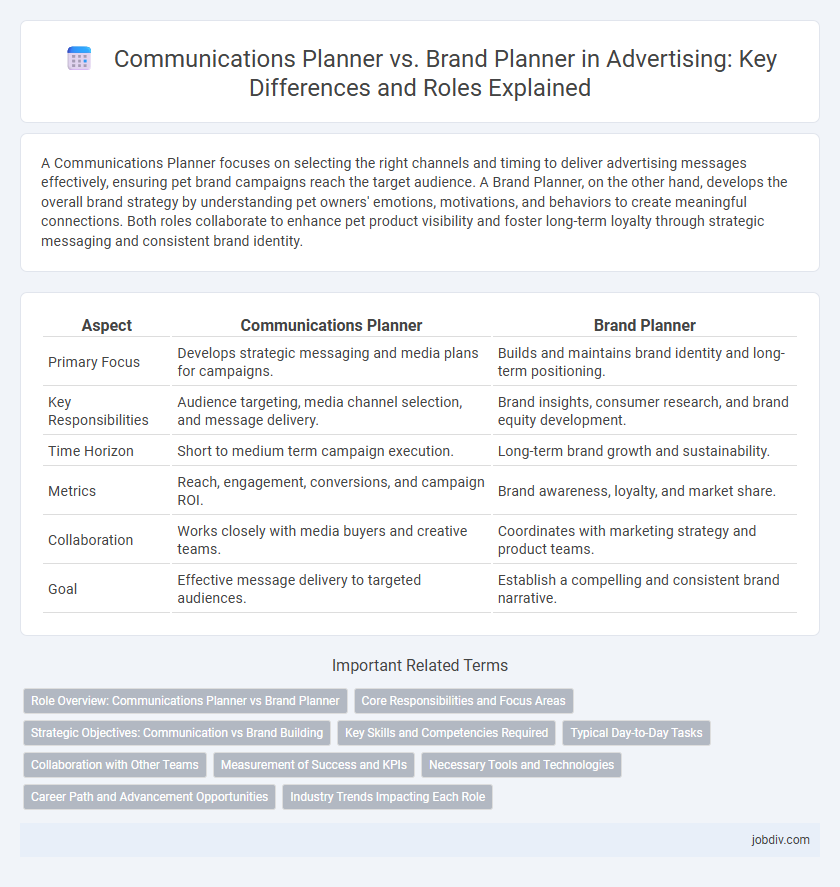A Communications Planner focuses on selecting the right channels and timing to deliver advertising messages effectively, ensuring pet brand campaigns reach the target audience. A Brand Planner, on the other hand, develops the overall brand strategy by understanding pet owners' emotions, motivations, and behaviors to create meaningful connections. Both roles collaborate to enhance pet product visibility and foster long-term loyalty through strategic messaging and consistent brand identity.
Table of Comparison
| Aspect | Communications Planner | Brand Planner |
|---|---|---|
| Primary Focus | Develops strategic messaging and media plans for campaigns. | Builds and maintains brand identity and long-term positioning. |
| Key Responsibilities | Audience targeting, media channel selection, and message delivery. | Brand insights, consumer research, and brand equity development. |
| Time Horizon | Short to medium term campaign execution. | Long-term brand growth and sustainability. |
| Metrics | Reach, engagement, conversions, and campaign ROI. | Brand awareness, loyalty, and market share. |
| Collaboration | Works closely with media buyers and creative teams. | Coordinates with marketing strategy and product teams. |
| Goal | Effective message delivery to targeted audiences. | Establish a compelling and consistent brand narrative. |
Role Overview: Communications Planner vs Brand Planner
Communications Planners focus on strategizing media channels and messaging to ensure targeted audience engagement and maximize campaign reach. Brand Planners concentrate on developing the brand's long-term positioning, identity, and consumer insights to build emotional connections and drive brand loyalty. Both roles collaborate closely but distinctively to balance short-term communication tactics with sustainable brand growth.
Core Responsibilities and Focus Areas
Communications Planners focus on developing effective messaging strategies across media channels to maximize audience engagement and campaign reach, emphasizing media planning, message targeting, and tactical execution. Brand Planners concentrate on long-term brand positioning and consumer insights, driving brand strategy through research, market analysis, and understanding consumer behavior to build brand equity. Both roles require collaboration with creative and media teams but differ in scope, with Communications Planners addressing immediate communication goals and Brand Planners shaping overarching brand narratives.
Strategic Objectives: Communication vs Brand Building
Communications Planners prioritize strategic objectives centered on immediate message delivery and audience engagement, aiming to maximize campaign reach and effectiveness across channels. Brand Planners focus on long-term brand building by developing emotional connections, consistent brand narratives, and reinforcing brand identity to foster customer loyalty. Both roles align marketing efforts but differ fundamentally in tactics and time horizon toward achieving strategic goals.
Key Skills and Competencies Required
Communications planners require expertise in media strategy, audience segmentation, and channel optimization to effectively deliver campaign messages across diverse platforms. Brand planners focus on consumer insights, brand positioning, and long-term strategic thinking to build strong, consistent brand identities. Both roles demand analytical skills, creativity, and the ability to interpret market research, but communications planners emphasize tactical execution while brand planners prioritize strategic brand development.
Typical Day-to-Day Tasks
Communications Planners focus on media strategy, selecting optimal channels, and scheduling ad placements to maximize campaign reach and frequency. Brand Planners primarily conduct consumer research, develop brand positioning, and craft messaging strategies aligned with long-term brand goals. Both roles collaborate closely, but Communications Planners emphasize tactical execution, while Brand Planners concentrate on strategic insights and brand narrative development.
Collaboration with Other Teams
Communications planners optimize campaign messaging by collaborating closely with media buyers and creative teams to ensure effective audience targeting across channels. Brand planners work alongside marketing strategists and product developers to align brand identity with long-term business goals and consumer insights. Both roles require seamless coordination to create cohesive advertising strategies that resonate and drive measurable results.
Measurement of Success and KPIs
Communications Planners measure success through campaign reach, engagement rates, and media efficiency, emphasizing metrics like impressions, click-through rates, and conversion tracking. Brand Planners focus on long-term brand equity indicators such as brand awareness, brand loyalty, and customer sentiment, utilizing KPIs like brand recall, net promoter score (NPS), and market share growth. Both roles optimize strategies using data-driven insights but target distinct performance outcomes aligned with immediate campaign impact versus sustained brand health.
Necessary Tools and Technologies
Communications Planners rely heavily on media planning software, audience analytics platforms, and digital tracking tools to optimize campaign reach and engagement across multiple channels. Brand Planners utilize market research databases, consumer insights tools, and brand equity measurement software to develop and refine brand positioning strategies. Both roles integrate collaboration platforms and data visualization tools to align strategic objectives and streamline workflow efficiency.
Career Path and Advancement Opportunities
Communications Planners primarily focus on media strategies and campaign execution, optimizing reach and engagement through targeted advertising channels. Brand Planners concentrate on long-term brand positioning, consumer insights, and strategic messaging to build brand equity over time. Career advancement for Communications Planners often leads to media director roles, while Brand Planners typically progress to brand management or strategic director positions, reflecting their deep involvement in brand development.
Industry Trends Impacting Each Role
Communications Planners increasingly rely on data analytics and AI-driven insights to optimize multi-channel campaign strategies in real-time, reflecting a shift towards personalized consumer engagement across digital platforms. Brand Planners focus on integrating sustainability and purpose-driven branding trends, addressing consumer demand for authentic and socially responsible brand narratives. Both roles adapt to evolving privacy regulations and the growth of influencer marketing, requiring agility in strategic planning to maintain relevance in competitive markets.
Communications Planner vs Brand Planner Infographic

 jobdiv.com
jobdiv.com